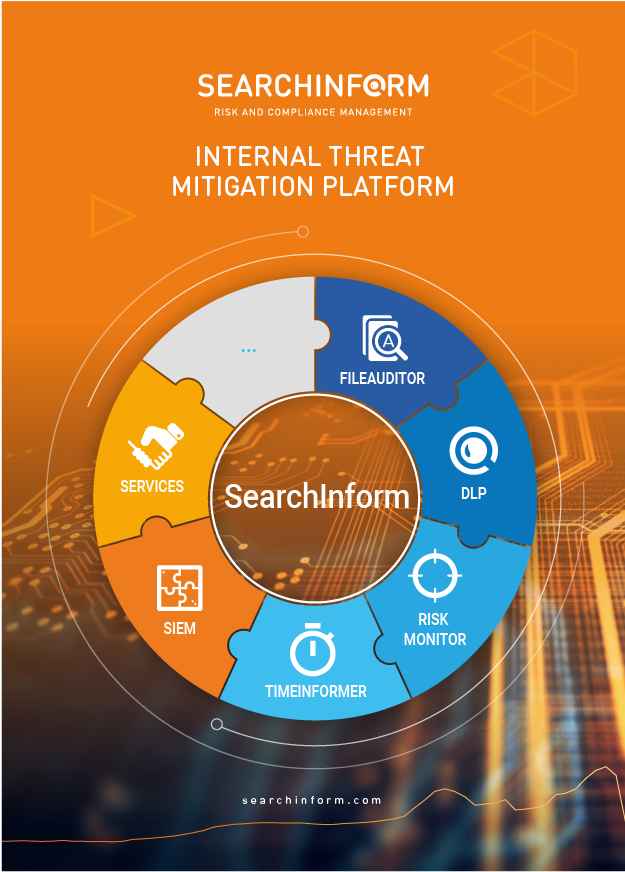Cybersecurity in Retail
- Introduction to Retail Cybersecurity
- Definition and Importance
- Historical Context
- Key Challenges in Retail Cybersecurity
- Sophisticated Cyber Threats
- Expanding Attack Surface
- Data Protection and Compliance
- Insider Threats and Human Error
- Supply Chain Vulnerabilities
- Best Practices for Retail Cybersecurity
- Implement Robust Access Controls
- Regular Security Training and Awareness Programs
- Secure Network Infrastructure
- Secure Payment Systems
- Regular Security Audits and Incident Response Plans
- Artificial Intelligence and Machine Learning
- Blockchain Technology
- Biometric Authentication
- Internet of Things (IoT) Security
- Cloud Security
- Securing the Retail Frontier: Unveiling SearchInform's Cybersecurity Expertise
- Advanced Threat Detection
- Comprehensive Data Protection
- 360-Degree Visibility
- User Behavior Analytics
- Scalability and Flexibility
Introduction to Retail Cybersecurity
In the digital age, where transactions and interactions increasingly occur online, cybersecurity stands as a critical safeguard for the retail sector. Defined as the practice of protecting computer systems, networks, and data from theft, damage, or unauthorized access, cybersecurity plays a pivotal role in ensuring the integrity and confidentiality of sensitive information within retail operations.
Definition and Importance
Cybersecurity encompasses a broad range of practices, technologies, and protocols aimed at mitigating risks posed by malicious actors, software vulnerabilities, and human error. It involves implementing measures such as encryption, firewalls, intrusion detection systems, and regular security audits to safeguard digital assets and maintain operational continuity. Moreover, cybersecurity extends beyond traditional IT infrastructure to encompass emerging technologies like cloud computing, mobile commerce, and Internet of Things (IoT) devices, which introduce new attack vectors and complexities.
In the retail sector, where customer data, payment information, and intellectual property are prime targets for cybercriminals, the importance of robust cybersecurity measures cannot be overstated. A breach not only jeopardizes consumer trust and brand reputation but also incurs significant financial losses in terms of regulatory penalties, legal liabilities, and remediation costs. Furthermore, with the proliferation of omnichannel retailing and the convergence of physical and digital environments, the attack surface expands, necessitating proactive cybersecurity strategies to address vulnerabilities across various touchpoints.
Historical Context
The evolution of cybersecurity in retail mirrors the rapid advancements in technology and the corresponding escalation of cyber threats. Historically, retail establishments relied on basic security measures such as antivirus software and network firewalls to protect against external intrusions. However, with the rise of e-commerce and digital payment systems, cyberattacks grew in sophistication and frequency, prompting the adoption of more robust cybersecurity frameworks.
High-profile data breaches, such as the Target breach in 2013, where hackers stole millions of customer credit card details, served as wake-up calls for the retail industry, highlighting the need for proactive security measures. Subsequent regulations, such as the Payment Card Industry Data Security Standard (PCI DSS), mandated stricter compliance requirements for handling payment card data, driving investment in cybersecurity infrastructure and expertise within retail organizations.
Cybersecurity in retail is not merely an option but a necessity in today's interconnected digital landscape. By understanding its definition, recognizing its importance, and contextualizing its evolution, retailers can proactively safeguard their assets, maintain consumer trust, and thrive in an increasingly competitive marketplace.
Key Challenges in Retail Cybersecurity
In the rapidly evolving landscape of retail, cybersecurity has emerged as a critical concern, with the industry facing a myriad of challenges in protecting sensitive data and ensuring operational resilience. Understanding these challenges is essential for retailers to implement effective strategies and technologies to mitigate risks and safeguard their digital assets.
Sophisticated Cyber Threats
One of the primary challenges facing the retail sector is the proliferation of sophisticated cyber threats. From ransomware attacks and phishing scams to malware infections and DDoS (Distributed Denial of Service) assaults, cybercriminals employ a diverse array of tactics to infiltrate retail networks, compromise systems, and steal valuable data. The dynamic nature of these threats poses a significant challenge for retailers, requiring constant vigilance and adaptive cybersecurity measures to detect and countermeasure attacks effectively.
Expanding Attack Surface
The expanding attack surface presents another significant challenge for cybersecurity in retail. With the rise of omnichannel retailing, which integrates physical stores, e-commerce platforms, mobile apps, and IoT (Internet of Things) devices, the number of entry points for cyber attackers has multiplied. Each new endpoint introduces potential vulnerabilities that can be exploited by malicious actors, making it increasingly challenging for retailers to maintain robust defenses across their entire digital ecosystem.
Data Protection and Compliance
Data protection and compliance represent ongoing challenges for retailers, particularly in light of stringent regulations such as GDPR (General Data Protection Regulation) and PCI DSS (Payment Card Industry Data Security Standard). Retailers are entrusted with vast amounts of sensitive information, including customer data, payment card details, and proprietary business data. Ensuring the confidentiality, integrity, and availability of this data while complying with regulatory requirements poses significant operational and legal challenges for retailers, necessitating robust data protection measures and compliance frameworks.
Insider Threats and Human Error
Despite technological advancements, insider threats and human error remain persistent challenges for cybersecurity in retail. Whether through malicious intent, negligence, or inadvertent actions, insiders can pose a significant risk to data security and operational continuity. Insider threats encompass a wide range of scenarios, including employee misconduct, privilege abuse, and inadvertent data leaks. Addressing these threats requires a combination of user awareness training, access controls, and monitoring mechanisms to detect and mitigate insider risks effectively.
Its discovery entails:
Supply Chain Vulnerabilities
Supply chain vulnerabilities have emerged as a growing concern for cybersecurity in the retail sector. Retailers rely on complex supply chains involving numerous vendors, partners, and third-party service providers, each representing a potential point of weakness in the security chain. Cyber attackers may target supply chain partners to gain access to retailers' networks, compromise systems, or disrupt operations. Mitigating supply chain risks requires robust vendor risk management programs, supply chain security assessments, and collaboration with partners to uphold security standards throughout the supply chain.
Retail cybersecurity challenges are multifaceted and evolving, requiring retailers to adopt a proactive and holistic approach to safeguarding their digital assets and protecting customer trust. From combating sophisticated cyber threats and securing expanding attack surfaces to ensuring data protection and compliance, addressing insider threats, and mitigating supply chain vulnerabilities, retailers must navigate a complex landscape of risks and challenges. By understanding these challenges and implementing comprehensive cybersecurity strategies and technologies, retailers can fortify their defenses, mitigate risks, and uphold the integrity and security of their digital operations.
Best Practices for Retail Cybersecurity
In the fast-paced world of retail, where digital transactions and online interactions have become the norm, cybersecurity has emerged as a critical component of business operations. To effectively protect sensitive data, ensure consumer trust, and mitigate cyber threats, retailers must adhere to a set of best practices designed to bolster their cybersecurity posture.
Implement Robust Access Controls
One of the foundational best practices for retail cybersecurity is the implementation of robust access controls. This involves restricting access to sensitive systems, data, and resources based on the principle of least privilege. By granting employees access only to the resources necessary for their roles, retailers can minimize the risk of unauthorized access and insider threats. Additionally, implementing multi-factor authentication (MFA) and strong password policies can further enhance access security and deter cyber attackers.
Regular Security Training and Awareness Programs
Human error remains one of the leading causes of data breaches in retail. To address this vulnerability, retailers should prioritize regular security training and awareness programs for employees at all levels of the organization. These programs should educate employees about common cyber threats, phishing scams, social engineering tactics, and best practices for data security. By fostering a culture of security awareness, retailers can empower employees to recognize and report potential security incidents, thereby reducing the likelihood of successful cyber attacks.
Secure Network Infrastructure
Securing the network infrastructure is essential for protecting retail operations from cyber threats. Retailers should implement firewalls, intrusion detection systems (IDS), and intrusion prevention systems (IPS) to monitor and filter network traffic, detect suspicious activities, and block malicious threats in real-time. Additionally, encrypting sensitive data in transit and at rest can further enhance network security and protect against data breaches. Regular vulnerability assessments and penetration testing can help identify and remediate weaknesses in the network infrastructure before they can be exploited by cyber attackers.
Secure Payment Systems
Payment card data is a prime target for cybercriminals targeting retail organizations. To secure payment systems and protect customer payment information, retailers should adhere to the Payment Card Industry Data Security Standard (PCI DSS) compliance requirements. This includes implementing secure payment processing technologies such as point-to-point encryption (P2PE) and tokenization, securing cardholder data storage, and conducting regular security assessments and audits. By prioritizing the security of payment systems, retailers can mitigate the risk of payment card data breaches and maintain compliance with industry regulations.

Regular Security Audits and Incident Response Plans
Regular security audits and incident response plans are essential components of effective cybersecurity in retail. Retailers should conduct regular audits of their IT infrastructure, systems, and policies to identify vulnerabilities, assess risks, and ensure compliance with security standards and regulations. Additionally, retailers should develop comprehensive incident response plans outlining procedures for detecting, responding to, and recovering from security incidents such as data breaches, malware infections, and DDoS attacks. By proactively preparing for security incidents, retailers can minimize their impact and restore normal operations swiftly.
Implementing best practices for cybersecurity is essential for retail organizations to protect sensitive data, maintain consumer trust, and mitigate cyber threats. By implementing robust access controls, prioritizing security training and awareness programs, securing network infrastructure and payment systems, conducting regular security audits, and developing incident response plans, retailers can strengthen their cybersecurity posture and reduce the risk of costly data breaches and cyber attacks. With cyber threats continuing to evolve, retailers must remain vigilant and proactive in their approach to cybersecurity to stay ahead of emerging threats and safeguard their digital operations.
In the ever-evolving landscape of retail cybersecurity, staying abreast of emerging technologies is paramount for retailers seeking to enhance their defenses against evolving cyber threats. From artificial intelligence and machine learning to blockchain and biometrics, a wide array of cutting-edge technologies is reshaping the way retailers approach cybersecurity.
Emerging Technologies in Retail Cybersecurity
Artificial Intelligence and Machine Learning
Artificial intelligence (AI) and machine learning (ML) have emerged as game-changers in retail cybersecurity, offering predictive analytics, anomaly detection, and automated threat response capabilities. By analyzing vast amounts of data in real-time, AI and ML algorithms can identify patterns, detect anomalies, and predict potential security breaches before they occur. From detecting fraudulent transactions and phishing attempts to identifying malware and insider threats, AI and ML empower retailers to proactively defend against a wide range of cyber threats with unprecedented speed and accuracy.
Blockchain Technology
Blockchain technology, best known for its role in cryptocurrencies like Bitcoin, is gaining traction in retail cybersecurity for its decentralized and immutable ledger capabilities. By leveraging blockchain, retailers can enhance the security and transparency of supply chain operations, track the provenance of products, and prevent counterfeit goods. Additionally, blockchain-based identity management solutions offer retailers a secure and decentralized way to manage customer identities and protect personal data from unauthorized access or tampering.
Biometric Authentication
Biometric authentication technologies, such as fingerprint recognition, facial recognition, and iris scanning, are revolutionizing the way retailers authenticate customers and employees. By replacing traditional passwords and PINs with biometric identifiers, retailers can enhance security while improving the user experience. Biometric authentication not only provides stronger security measures but also mitigates the risk of credential theft and unauthorized access. From securing point-of-sale terminals to enabling secure access to sensitive systems and data, biometric authentication is becoming increasingly prevalent in retail cybersecurity.
Internet of Things (IoT) Security
The proliferation of Internet of Things (IoT) devices in retail environments presents both opportunities and challenges for cybersecurity. While IoT devices offer retailers valuable insights into customer behavior and operational efficiency, they also introduce new attack vectors and security vulnerabilities. Securing IoT devices requires a comprehensive approach that includes device authentication, encryption, firmware updates, and network segmentation. Additionally, implementing IoT security frameworks and standards can help retailers mitigate the risk of IoT-related cyber threats and ensure the integrity and confidentiality of IoT data.
Cloud Security
As retailers increasingly adopt cloud-based solutions for e-commerce, data analytics, and customer relationship management, ensuring the security of cloud environments has become a top priority. Cloud security technologies, such as encryption, access controls, and security monitoring, help retailers protect sensitive data stored in the cloud and mitigate the risk of data breaches and unauthorized access. Additionally, implementing cloud security best practices, such as regular audits, encryption key management, and data loss prevention (DLP) measures, can help retailers maintain compliance with regulatory requirements and safeguard their digital assets.
Emerging technologies are revolutionizing the field of retail cybersecurity, offering retailers innovative tools and solutions to combat evolving cyber threats. From artificial intelligence and machine learning to blockchain, biometrics, IoT security, and cloud security, retailers have a wide array of technologies at their disposal to enhance their cybersecurity posture and protect sensitive data. By embracing these technologies and staying ahead of emerging threats, retailers can strengthen their defenses, maintain consumer trust, and thrive in an increasingly digital marketplace.
Securing the Retail Frontier: Unveiling SearchInform's Cybersecurity Expertise
In the ever-evolving landscape of retail cybersecurity, finding effective solutions is paramount to safeguarding sensitive data and maintaining consumer trust. SearchInform offers comprehensive cybersecurity solutions tailored to the unique challenges faced by the retail sector. Let's explore the benefits of SearchInform's offerings in enhancing retail cybersecurity.
Advanced Threat Detection
One of the primary benefits of SearchInform's solutions is their advanced threat detection capabilities. Leveraging cutting-edge technologies such as machine learning and behavior analytics, SearchInform can identify and mitigate potential threats in real-time. Whether it's detecting suspicious user activity, anomalous network behavior, or emerging malware strains, SearchInform's solutions provide retailers with proactive defense mechanisms to thwart cyberattacks before they inflict damage.
Comprehensive Data Protection
In retail, data is currency, and protecting sensitive information is paramount. SearchInform offers comprehensive data protection features, including encryption, data loss prevention (DLP), and access controls, to safeguard customer data, payment information, and intellectual property. By implementing robust data protection measures, retailers can ensure compliance with regulations such as GDPR and PCI DSS while mitigating the risk of costly data breaches and regulatory penalties.
360-Degree Visibility
SearchInform's solutions provide retailers with 360-degree visibility into their digital ecosystem, allowing them to monitor and analyze activities across endpoints, networks, and cloud environments. With centralized dashboards and customizable reporting tools, retailers gain insights into user behavior, system vulnerabilities, and compliance posture in real-time. This visibility enables proactive threat hunting, incident response, and policy enforcement, empowering retailers to stay ahead of evolving cyber threats.
User Behavior Analytics
Understanding user behavior is crucial for detecting insider threats and unauthorized activities within retail organizations. SearchInform employs advanced user behavior analytics (UBA) to analyze patterns, anomalies, and deviations in user actions, enabling early detection of suspicious behavior indicative of insider threats, credential theft, or unauthorized access. By correlating disparate data sources and contextualizing user actions, SearchInform's UBA capabilities empower retailers to identify and mitigate insider risks effectively.
Scalability and Flexibility
As retail operations evolve and expand, scalability and flexibility become essential considerations for cybersecurity solutions. SearchInform offers scalable solutions that can adapt to the dynamic needs of retail organizations, whether they operate a single storefront or a global network of stores. With flexible deployment options, including on-premises, cloud, and hybrid models, SearchInform's solutions can accommodate diverse IT environments and regulatory requirements, ensuring seamless integration and scalability as retailers grow and evolve.
SearchInform solutions offer a multitude of benefits for enhancing cybersecurity in the retail sector. From advanced threat detection and comprehensive data protection to 360-degree visibility and user behavior analytics, SearchInform empowers retailers to proactively defend against cyber threats, safeguard sensitive data, and maintain compliance with regulatory standards. With scalable and flexible offerings tailored to the unique needs of retail organizations, SearchInform is a trusted partner in securing the future of retail cybersecurity.
Elevate your retail cybersecurity strategy with SearchInform's comprehensive solutions. Discover the power of advanced threat detection, data protection, and user behavior analytics to safeguard your digital assets. Partner with SearchInform and stay ahead of cyber threats in the dynamic landscape of retail cybersecurity.
Full-featured software with no restrictions
on users or functionality
Company news
SearchInform uses four types of cookies as described below. You can decide which categories of cookies you wish to accept to improve your experience on our website. To learn more about the cookies we use on our site, please read our Cookie Policy.
Necessary Cookies
Always active. These cookies are essential to our website working effectively.
Cookies does not collect personal information. You can disable the cookie files
record
on the Internet Settings tab in your browser.
Functional Cookies
These cookies allow SearchInform to provide enhanced functionality and personalization, such as remembering the language you choose to interact with the website.
Performance Cookies
These cookies enable SearchInform to understand what information is the most valuable to you, so we can improve our services and website.
Third-party Cookies
These cookies are created by other resources to allow our website to embed content from other websites, for example, images, ads, and text.
Please enable Functional Cookies
You have disabled the Functional Cookies.
To complete the form and get in touch with us, you need to enable Functional Cookies.
Otherwise the form cannot be sent to us.

Subscribe to our newsletter and receive a bright and useful tutorial Explaining Information Security in 4 steps!

Subscribe to our newsletter and receive case studies in comics!







